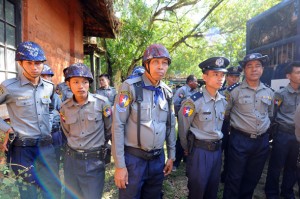MNHRC at the Crossroads; “Alibi” of the Government or Ally of the People?
By Burma Partnership • November 24, 2015 Last week, a fact-finding mission comprised of the Asian Forum for Human Rights and Development (Forum-Asia) and Burma Partnership released a statement on the impact and effectiveness of the Myanmar National Human Rights Commission (MNHRC). The statement reflected the conclusions drawn from a mission conducted from 16-18 November, 2015. The statement noted serious concerns relating to issues of credibility, a lack of adherence to the Paris Principles, a failure to engage with repressive legislation in Burma, and an inability to effectively counter widespread human rights abuses such as land confiscation.
Last week, a fact-finding mission comprised of the Asian Forum for Human Rights and Development (Forum-Asia) and Burma Partnership released a statement on the impact and effectiveness of the Myanmar National Human Rights Commission (MNHRC). The statement reflected the conclusions drawn from a mission conducted from 16-18 November, 2015. The statement noted serious concerns relating to issues of credibility, a lack of adherence to the Paris Principles, a failure to engage with repressive legislation in Burma, and an inability to effectively counter widespread human rights abuses such as land confiscation.
According to the statement, “the MNHRC is at risk of becoming an ‘alibi’ institution to legitimize the government. Underlying this assertion is the lack of both real and perceived independence of the MNHRC. This creates an atmosphere of distrust and disengagement, and puts the MNHRC at risk of being discredited entirely by civil society organizations and [Human Rights Defenders] in the country.”
This sentiment is represented in an annual report from the Asian NGO Network on National Human Rights Institutions (ANNI), co-authored by Burma Partnership, Smile Education and Development Foundation, and Equality Myanmar, which similarly seeks to address the effectiveness of the MNHRC. In both the 2014 and 2015 editions of the report, the lack of transparency and civil society engagement, along with the power held by the executive during the appointment of MNHRC members, were highlighted as serious obstacles to its effectiveness and independence.
The joint fact-finding mission cites the MNHRC’s investigation into the death of journalist Ko Par Gyi along with the Letpadan police crackdown as evidence of the institutions’ inability to adequately preserve and protect human rights standards in the country. In the case of Ko Par Gyi, the MNHRC failed to investigate allegations of torture and the Burma Army’s involvement in the extrajudicial killing of the respected journalist, while simultaneously making it difficult for his widow and human rights defender, Ma Thandar, to bring the investigation forward. Similarly, in the case of the crackdown on students protesting the new education law in Letpadan in March 2015, the fact-finding mission noted the failure of the MNHRC to pursue allegations of the mistreatment and torture of students placed in custody after the violent crackdown. In addition to these cases, the MNHRC has also received strong criticism for allowing Brang Shawng to be criminally prosecuted by the Burma Army, after he called on the institution to investigate the death of his 14-year-old daughter who was shot dead during Burma Army military operations in Kachin State.
In a country in which serious human rights abuses are pervasive – and at worst, perpetrated with impunity by the Burma Army – the need for an effective national human rights institution (NHRI) could not be more pressing. According to a recent report from the ASEAN Parliamentarians for Human Rights, the persecution of Rohingya in Arakan State, widespread armed conflict and a fractured peace process, and the lack of freedom of expression and freedom of religion in Burma all point to a dire state of human rights.
The incoming National League for Democracy (NLD) Government has a responsibility to commit to upholding international values of human rights and the rule of law. It can begin by aligning the MNHRC with the “Paris Principles” – the guiding responsibilities of NHRIs, as set forth by the United Nations General Assembly in 1993. In particular, the NLD Government should amend the enabling law of the MNHRC so that it reflects the Paris Principles’ notion of “independence” and ensure a robust reform of the institution, including ensuring a transparent selection process of commissioners and hiring of staff. It should also guarantee that the MNHRC is capable of conducting investigations into all human rights abuses, including those perpetrated by the Burma Army. Only through significant reform can the MNHRC prove that it is truly a credible NHRI.
Tags: Asian NGO Network on National Human Rights Institutions, Burma Partnership, Equality Myanmar, Human Rights, Kachin State, Letpadan, Myanmar National Human Rights Commission, National League for Democracy, Smile Education and Development FoundationThis post is in: Blog
Related Posts2015 ANNI Report on the Performance and Establishment of National Human Rights Institutions in Asia
The Myanmar National Human Rights Commission Continues Failing to Deliver
2014 ANNI Report on the Performance and Establishment of National Human Rights Institutions in Asia
2013 ANNI Report on the Performance and Establishment of National Human Rights Institutions in Asia
Civil Society’s Concerns on Draft MNHRC Law Must Be Adequately Addressed









 All posts
All posts